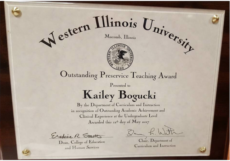By Maria Cohut Amyotrophic lateral sclerosis, or ALS, is a progressive neurodegenerative disease that leads to the death of nerve cells that control movement, leaving people unable to move and, eventually, to breathe. ALS is fatal and, so far, incurable. Can new findings bring hope for novel therapies? ALS, also known as Lou Gehrig’s disease, affects approximately 30,000 people in the United States alone. Still, its causes remain largely unknown. There is currently no cure, […]
Tag: eparent
Forgetting Milestones and Learning to Measure Progress…a New Way of Thinking! #Overcoming — Part 2
By Mary Ellen Bogucki I never thought my daughter, Kailey, would struggle in school. She was such a determined little girl who problem-solved at an early age. She was a little go getter and seemed to be so advanced for her age. Then it was time for kindergarten and she wasn’t learning her letters or numbers and didn’t want to learn to write her name. She was a great little student, making lots of friends, […]
Later-born siblings of children with autism or ADHD are at elevated risk for both disorders
(SACRAMENTO) — Later-born siblings of children with autism spectrum disorder (ASD) or attention-deficit/hyperactivity disorder (ADHD) are at elevated risk for both disorders, a new study led by Meghan Miller, assistant professor in the Department of Psychiatry and Behavioral Sciences and at the UC Davis MIND Institute, has concluded. The findings appear today in JAMA Pediatrics. The study suggests that families who already have a child diagnosed with ASD or ADHD may wish to monitor younger […]
What is stimming?
By Lori Smith BSN MSN CRNP Reviewed by Timothy J. Legg, PhD, CRNP Repetitive body movements or repetitive movement of objects is referred to as self-stimulatory behavior, abbreviated to stimming. Stimming can occur in people with autism and other developmental disabilities. Some people will stim when nervous, employing behaviors such as pacing, biting their nails, hair twirling, or tapping their feet or fingers. In this article, we will examine why stimming occurs and the different […]
High functioning autism through my eyes
Contrary to what professionals thought when I’d been diagnosed, I loved fiction and cultural critique. By Jonathan Rowland At the risk of explaining the obvious to the neurotypicals — people not on the autistic spectrum — in the audience, I know that I am not every autistic person. I can only speak of my experience as a thirtysomething white cis man who grew up in semirural Hertfordshire. This is still an autistic experience and, while […]





